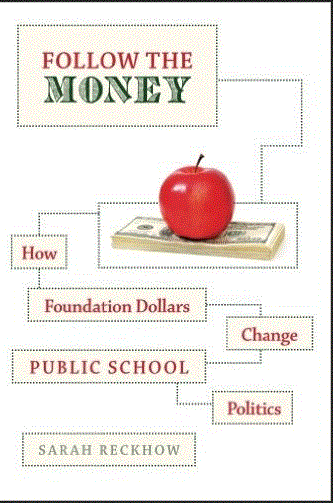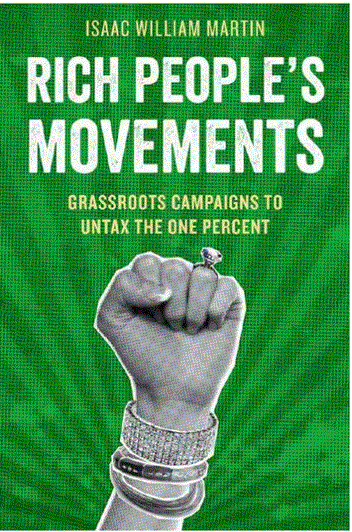The list of dark money groups in Massachusetts is growing, led by actors supporting Question 2 on charter schools. We can make some reasonable inferences about the real funders but we can’t say for sure who they are. Since they prefer to remain hidden, perhaps some theory can help us understand their motivations better.
I’m going to trace out two approaches. The first I take from Professor Sarah Reckhow’s Follow the Money: How Foundation Dollars Change Public School Politics about the role of “Boardroom Progressives” in pushing reform of American education. The second theory I take from Professor Isaac William Martin’s Rich People’s Movements: Grassroots Movements to Untax the One Percent. Martin’s work is illuminated by Benjamin Page, Larry Bartels, and Jason Seawright’s journal article, Democracy and the Policy Preferences of Wealthy Americans.

Professor Reckhow’s specifically traces spending of wealthy individuals and their foundations to reform education (she doesn't focus on dark money, only visible money). She sees these patrons as representing elite elements of society and describes them as “Boardroom Progressives.” In a journal article, Reckhow and co-authors identify the money as largely coming from the financial and tech industries.
These wealthy individuals are taken with the market model of education and favor charters, testing, merit pay and similar ideas. They are highly skeptical of politics and bureaucracy in public education, and especially disfavor unions. “They also share a suspicious view of the role of politics and special interests in education policy, as well as a common sense of idealism.” In terms of where they put their dollars, they prefer places where strong mayoral or state control are present instead of the messy politics of school committees and more democratically formed bases of control. A sympathetic mayor (Michael Bloomfield, John Connolly) or governor (Mario Cuomo, Charlie Baker) makes the Boardroom Progressives more likely to invest. Reckhow notes that these “venture philanthropists” see themselves as innovators and policy entrepreneurs, but they have little claim to a public constituency.

The other theory that may apply is derived from Isaac Martin’s Rich People’s Movements: Grassroots Campaigns to Untax the One Percent. This may seem odd – the rich have tried and true avenues to prevail politically that utilize their great advantage – money - to make campaign contributions or lobby. But in some cases those techniques don’t work and the rich organize. According to Martin, they do this when they perceive a policy threat that affects many people at once, and where they can identify policymakers as a focal point. This does not seem to apply directly to privatization as the rich are instigating policy, not defending. But as Alexander Hertel-Fernandez points out in New Conservative Strategies to Weaken America’s Public Sector Unions, it has been a goal of conservatives for decades to weaken public sector unions, the better to dominate politics. And Martin finds the rich proactive too.
Martin argues that the rich turn to social movements when their usual tactics are not working and when they are taught the appropriate skills to use grassroots by a “movement entrepreneur.” You can purchase off-the-shelf grass roots now – look through the OCPF reports and you’ll see the ballot committee Campaign for Fair Access to Quality Public Schools (funded by the WalMart heirs) paying $450,000 to Five Corners Strategies, which specializes in “grassroots public affairs.”
A recent study by political scientists Benjamin Page, Larry Bartels, and Jason Seawright, Democracy and the Policy Preferences of Wealthy Americans probed how different wealthy individuals are from the 99% in their outlook. On education the researchers concluded that “Our data suggest that the great enthusiasm of wealthy Americans for improving the US educational system mostly focuses on improving effectiveness through relatively low budget, market-oriented reforms, not on spending the very large sums of money that might be necessary to provide high quality public schools, college scholarships, or worker retraining for all Americans.”
That finding is also supported in a study done by Common Cause New York, Polishing the Apple: Examining Political Spending in New York to Influence Education Policy. The report tracked spending over a period of years by both unions and privatizers, including Dark Money Families for Excellent Schools of New York, which funds Dark Money Great Schools Massachusetts of New York. Common Cause found that “The same think-tanks and foundations that support charter schools and education tax credits also support the elimination of the very taxes that create a robust public school system and viable municipal infrastructure.”
The wealthy, as the Page, Bartels, and Seawright study notes, care a lot about their taxes and they rarely utilize the public schools for their own children.
So if you follow the theory of Rich People’s Movements, the charter campaign offers a number of benefits to the wealthy. It salves their interest in promoting education while protecting their own wallets. Since the movement would weaken unions, which are the only institutional source of funding for a politics that advocates public spending, the wealthy can debilitate their most effective organized political opposition. If unions are weaker that should affect their capacity to advocate for the millionaires’ tax in 2018. It also aids the 2018 campaign of Governor Charlie Baker, since unions were the funders of the SuperPAC that opposed his election in 2014. In Wednesday’s Boston Globe Jim O’Sullivan wrote Usually amicable Baker keeps sparring with labor in which he describes conflict between the governor and organized labor as politically beneficial to the governor. Baker’s 2014 campaign manager and current adviser Jim Conroy practically did a happy dance off the pages of the Globe as he described how unpopular carmen and unionized janitors are. According to OCPF, Dark Money Great Schools Massachusetts of New York has paid Mr. Conroy $90,000.00 for campaign management fees.
It’s quite an education, alright.
Louis D. Brandeis: "We must make our choice. We may have democracy, or we may have wealth concentrated in the hands of a few, but we can't have both."
[Full disclosure: as an educator in the UMass system, I am a union member. I write about dark money, and not charter schools. I've never written about charter schools, nor taken a position on them. I have taken a position against plutocracy and in favor of democracy, and thus against dark money. Additional disclosure: a relative is employed by Five Corners Strategy.

